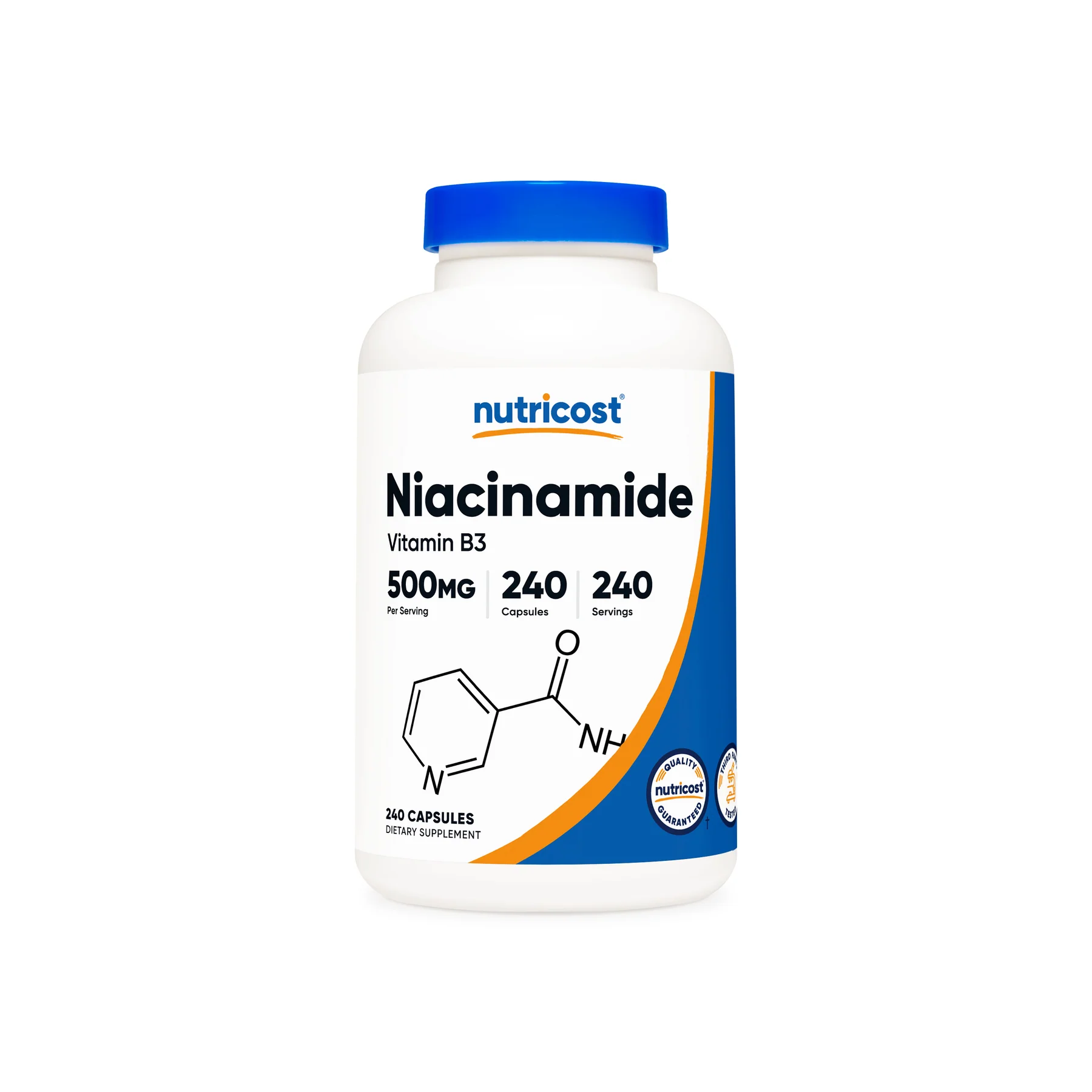When it comes to skincare, there is a wide array of ingredients that claim to improve the health and appearance of your skin. Two popular ingredients that have gained significant attention in recent years are niacinamide and vitamin C. These compounds are often praised for their ability to address various skin concerns, including pigmentation, acne, and aging. In this blog post, we will explore the benefits and differences of niacinamide and vitamin C to help you understand which one might be better suited for your skincare routine.
Niacinamide: The Multitasker Niacinamide
Also known as vitamin B3, is a water-soluble vitamin that offers a plethora of benefits for the skin. One of its key functions is regulating the production of sebum, making it an excellent ingredient for those struggling with oily or acne-prone skin. Niacinamide is also known to strengthen the skin barrier, improving moisture retention and reducing Tran epidermal water loss. This makes it a suitable choice for individuals with dry or sensitive skin.
Additionally, niacinamide has been shown to inhibit the transfer of pigment within the skin, making it effective in reducing the appearance of hyperpigmentation, dark spots, and uneven skin tone. It also possesses anti-inflammatory properties, which can help calm redness and soothe irritated skin. Another notable benefit of niacinamide is its ability to stimulate collagen production, promoting firmer and more elastic skin.
Vitamin C: The Brightening Agent Vitamin C
Also known as ascorbic acid, is a potent antioxidant that plays a crucial role in maintaining healthy skin. One of its primary functions is its ability to inhibit the production of melanin, making it an excellent choice for those dealing with hyperpigmentation and sunspots. Vitamin C also helps reduce the appearance of fine lines and wrinkles by stimulating collagen synthesis, leading to smoother and more youthful-looking skin.
Moreover, vitamin C protects the skin from harmful free radicals and environmental stressors, such as UV radiation and pollution. It has the ability to neutralize these damaging agents, preventing premature aging and promoting overall skin health. Additionally, vitamin C can improve skin texture, brighten dull complexions, and even out skin tone, resulting in a radiant and glowing appearance.
Niacinamide vs. Vitamin C
How They Differ While niacinamide and vitamin C offer similar benefits, there are some notable differences between the two:
- Stability: Niacinamide is more stable and less prone to oxidation than vitamin C, which can be quite sensitive to light and air. This means that niacinamide products tend to have a longer shelf life and are less likely to lose their potency over time.
- pH Sensitivity: Vitamin C requires a low pH environment to remain effective, typically around pH 3.5 or lower. Niacinamide, on the other hand, is not as sensitive to pH levels and can be used in a wider range of formulations without compromising its efficacy.
- Compatibility: Niacinamide and vitamin C can be used together in a skincare routine, contrary to the myth that they cancel each other out. However, some individuals with highly sensitive skin may experience mild irritation when using the two ingredients together. In such cases, it is best to apply them at different times or opt for separate products.
Conclusion: Niacinamide and vitamin C are both powerful ingredients that offer numerous benefits for the skin. Niacinamide is a versatile multitasker, suitable for various skin types, whereas vitamin C excels in brightening and protecting the skin from environmental damage. Ultimately, the choice between the two depends on your specific skincare concerns and preferences. Consider consulting with a dermatologist or
In recent years, niacinamide vitamins have gained significant attention in the health and wellness industry. Also known as vitamin B3, niacinamide offers a wide range of benefits for the body, particularly for the skin, nervous system, and overall metabolic health. In this comprehensive guide, we will delve into the world of niacinamide vitamins, exploring their benefits, uses, potential side effects, and recommended dosages.
Understanding Niacinamide: What is it?
Niacinamide, also referred to as nicotinamide, is a water-soluble form of vitamin B3. It is an essential nutrient that plays a vital role in various bodily functions. Niacinamide is naturally present in several food sources, including meat, fish, legumes, and grains. However, it can also be taken as a dietary supplement.
Niacinamide and Niacin: What’s the Difference?
Niacinamide and niacin are often used interchangeably, but they are not the same. Both forms are derived from vitamin B3, but they have distinct characteristics and functions in the body. Niacin, also known as nicotinic acid, has been primarily studied for its lipid-lowering effects and role in cardiovascular health, while niacinamide is more commonly associated with its benefits for the skin and overall metabolic health.
Benefits of Niacinamide Vitamins
- Promotes Healthy Skin: One of the most well-known benefits of niacinamide is its positive impact on skin health. It helps enhance the skin’s natural barrier, improves moisture retention, and reduces inflammation. Niacinamide has been shown to be effective in treating conditions such as acne, rosacea, hyperpigmentation, and aging signs like fine lines and wrinkles.
- Supports Nervous System Function: Niacinamide plays a crucial role in maintaining a healthy nervous system. It supports the production of neurotransmitters, which are essential for proper brain function and communication between nerve cells. Adequate niacinamide levels may contribute to improved cognitive function and a reduced risk of neurodegenerative diseases.
- Boosts Metabolic Health: Niacinamide is involved in the metabolism of carbohydrates, fats, and proteins. It helps convert food into energy and is crucial for the proper functioning of enzymes involved in these processes. Adequate niacinamide levels are essential for a healthy metabolism and can support weight management efforts.
- Supports Cardiovascular Health: While niacinamide is not typically associated with cholesterol-lowering effects like niacin, it may still have positive impacts on cardiovascular health. It can help maintain healthy blood vessel function, regulate blood pressure, and support optimal heart function.
Uses of Niacinamide Vitamins
- Skincare: Niacinamide is widely used in skincare products for its ability to improve the appearance of the skin. It can help regulate sebum production, minimize pore size, reduce redness and inflammation, and enhance overall skin texture. Niacinamide can be found in various formulations, including creams, serums, and toners.
- Dietary Supplement: Niacinamide supplements are available in various forms, including capsules and tablets. They can be taken orally to support overall health and well-being. It is important to follow recommended dosages and consult with a healthcare professional before starting any new supplement regimen.
- Combination Therapies: Niacinamide is often used in combination with other skincare ingredients or medications to enhance their effects. It can complement the benefits of ingredients like retinol, hyaluronic acid, and vitamin C, leading to a more comprehensive skincare routine.

What are the common questions and answers about Niacinamide Vitamins
Here are the common questions about niacinamide vitamins along with their answers:
- What is niacinamide? Niacinamide, also known as nicotinamide, is a form of vitamin B3. It is an essential nutrient that plays a crucial role in various bodily functions.
- What are the benefits of taking niacinamide vitamins? Niacinamide has several potential benefits, including supporting skin health, improving cholesterol levels, boosting brain function, promoting joint mobility, and supporting overall energy metabolism.
- How does niacinamide work in the body? Niacinamide is involved in the synthesis of coenzymes that are necessary for energy production and metabolism. It also plays a role in DNA repair and cell signaling.
- Is niacinamide the same as niacin? Niacinamide and niacin are two different forms of vitamin B3. While they share similarities, such as their role as precursors to important coenzymes, they have some distinct properties and functions.
- What are the dietary sources of niacinamide? Niacinamide can be found in various food sources, including meat, fish, poultry, dairy products, legumes, nuts, and enriched or fortified grain products.
- Can niacinamide help with skin conditions? Niacinamide has been shown to have positive effects on certain skin conditions, such as acne, rosacea, hyperpigmentation, and aging-related changes in the skin. It can help improve the skin’s barrier function and reduce inflammation.
- Are there any side effects of niacinamide? Niacinamide is generally considered safe and well-tolerated when taken within the recommended dosage range. Side effects are rare but may include flushing, itching, and gastrointestinal discomfort in some individuals.
- What is the recommended daily intake of niacinamide? The recommended daily intake of niacinamide varies depending on age, sex, and individual needs. In general, adult men need about 16 mg per day, while adult women need about 14 mg per day.
- Can niacinamide be taken with other medications or supplements? Niacinamide may interact with certain medications or supplements, so it’s important to consult with a healthcare professional if you are taking any medications or have underlying health conditions.
- Are there any drug interactions to be aware of when taking niacinamide? Niacinamide may interact with medications like diabetes medications, blood thinners, and certain anticonvulsants. It’s important to discuss potential interactions with your healthcare provider.
Remember to consult a healthcare professional or a registered dietitian for personalized advice regarding niacinamide supplementation or any specific health concerns you may have.

Where can shoppers find niacinamide vitamin products?
Niacinamide vitamin products are commonly available in various locations. Here are some places where shoppers can find niacinamide vitamin products:
1. Pharmacies: Local pharmacies and drugstores often carry a range of vitamin and supplement products, including niacinamide vitamins. Look for them in the vitamin and supplement aisle.
2. Health Food Stores: Health food stores specialize in natural and organic products, including dietary supplements. These stores typically have a dedicated section for vitamins and supplements, where you can find niacinamide products.
3. Online Retailers: Numerous online retailers, such as Amazon, eBay, and specialty supplement websites, offer a wide variety of niacinamide vitamin products. You can browse their selections, compare prices, and read customer reviews before making a purchase.
4. Supermarkets and Grocery Stores: Many supermarkets and grocery stores have a health and wellness section that includes vitamins and supplements. Check the supplement aisle or the pharmacy section of the store for niacinamide vitamin products.
5. Vitamin Specialty Stores: Some cities have stores that specialize in vitamins and supplements. These stores typically carry a wide range of products, including niacinamide vitamins.
When purchasing niacinamide vitamin products, it’s important to choose reputable brands that adhere to quality standards. Look for products that have undergone third-party testing for purity and potency. Additionally, check the labels for the recommended dosage and any additional ingredients to ensure they meet your needs and preferences.
Remember to consult with a healthcare professional or a registered dietitian if you have any specific health concerns or questions about niacinamide supplementation.

What are top foods high in Niacin?
- Chicken breast: Chicken breast is a good source of niacin. It provides about 11.4 mg of niacin per 100 grams.
- Tuna: Tuna is a fish that is rich in niacin. It contains approximately 11.3 mg of niacin per 100 grams.
- Turkey: Turkey meat is another excellent source of niacin. It provides around 8.6 mg of niacin per 100 grams.
- Salmon: Salmon is a nutrient-dense fish that contains niacin. It provides about 8.6 mg of niacin per 100 grams.
- Peanuts: Peanuts are a legume that is high in niacin. They contain approximately 13.8 mg of niacin per 100 grams.
- Mushrooms: Certain mushrooms, such as portobello and white mushrooms, are good sources of niacin. They typically provide around 3.7 to 5.5 mg of niacin per 100 grams.
- Green peas: Green peas are a vegetable that contains niacin. They provide approximately 2.1 mg of niacin per 100 grams.
- Sunflower seeds: Sunflower seeds are a nutritious snack that contains niacin. They typically contain around 8.3 mg of niacin per 100 grams.
- Avocado: Avocado is a healthy fruit that is a source of niacin. It provides about 1.7 mg of niacin per 100 grams.
- Brown rice: Brown rice is a whole grain that contains niacin. It typically provides around 4.2 mg of niacin per 100 grams.
It’s important to note that the niacin content can vary depending on factors such as the specific variety, cooking methods, and ripeness of the food.

Vitamin B3 For Skincare
When it comes to achieving healthy, radiant skin, there’s no shortage of skincare ingredients to explore. One noteworthy player in the skincare world is Vitamin B3, also known as niacinamide. This powerhouse nutrient offers a range of benefits for your skin, making it a popular choice in numerous skincare products. In this blog, we’ll delve into the wonders of Vitamin B3 and why it deserves a spot in your skincare routine.
Understanding Vitamin B3: Vitamin B3 is a water-soluble vitamin that belongs to the B-complex family. It exists in two forms: niacin (nicotinic acid) and niacinamide (nicotinamide). In skincare, niacinamide is the preferred form due to its stability and compatibility with various formulations.
Benefits of Vitamin B3 for the Skin:
- Enhanced Skin Barrier Function: Vitamin B3 strengthens the skin’s natural barrier, helping to prevent moisture loss and maintain hydration. This fortification supports the skin’s defense against external aggressors and promotes a healthy, supple complexion.
- Reduced Hyperpigmentation: Niacinamide has been found to inhibit the transfer of pigment within the skin, helping to reduce the appearance of dark spots, hyperpigmentation, and uneven skin tone. This makes it a valuable ingredient for those dealing with sun damage or post-inflammatory hyperpigmentation.
- Minimized Fine Lines and Wrinkles: Vitamin B3 has shown promise in improving the appearance of fine lines and wrinkles. It stimulates collagen production and elastin synthesis, which can lead to smoother, firmer skin with regular use.
- Oil Control for Acne-Prone Skin: For those with oily or acne-prone skin, niacinamide can be a game-changer. It helps regulate sebum production, reducing excess oiliness and preventing clogged pores. This, in turn, can minimize the occurrence of breakouts and blemishes.
- Calming and Soothing Effects: Niacinamide possesses anti-inflammatory properties that can soothe redness, irritation, and sensitivity. It can be beneficial for individuals with rosacea, eczema, or sensitive skin conditions.
Incorporating Vitamin B3 into Your Skincare Routine: Integrating Vitamin B3 into your skincare routine is straightforward. Look for products specifically formulated with niacinamide as an active ingredient. These can include serums, moisturizers, masks, and even cleansers. Here are some tips for incorporating it effectively:
- Patch Test: Before introducing any new product, especially if it contains a potent ingredient like niacinamide, perform a patch test to check for any adverse reactions or sensitivities.
- Layering: Vitamin B3 is compatible with most skincare ingredients, allowing for easy integration into your existing routine. Apply it after cleansing and toning but before heavier creams or oils.
- Daily Use: Consistency is key. Incorporate Vitamin B3 into your skincare routine by using it once or twice daily for optimal results. Follow the recommended usage instructions on the product you choose.
- Pairing with Sunscreen: Niacinamide works synergistically with sunscreen to provide enhanced protection against harmful UV rays. Consider layering a broad-spectrum sunscreen over your niacinamide-containing products during the day for comprehensive defense.
Conclusion: Vitamin B3, or niacinamide, is a multitasking ingredient that can elevate your skincare routine to new heights. From improving the skin’s barrier function to reducing hyperpigmentation and calming inflammation, its benefits are hard to ignore. Whether you’re tackling acne, signs of aging, or simply seeking a healthier complexion, Vitamin B3 is a valuable addition to your skincare arsenal.


0 Comments